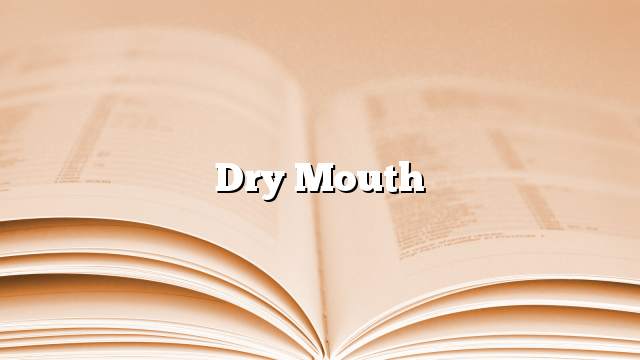Dry mouth
Saliva is important for its role in preventing cavities, reducing bacteria growth, washing the oral cavity of food residue, and it also has a role in the ability to taste, swallow and chew, and there are enzymes in saliva that help digestion. Dry mouth is a condition in which salivary glands are unable to produce sufficient amounts of saliva to keep the mouth moist, and everyone may get dry mouth from time to time in cases of tension and anxiety and emotion.
Causes of dry mouth
There are many reasons that lead to dry mouth, the most important of which are:
- Dry body : The lack of sufficient fluid in the body is sufficient to produce saliva. Dryness of the body may be caused by problems such as fever, excessive sweating, vomiting, burns, diarrhea or blood loss.
- pharmaceutical: There are some types of medicines that cause dry mouth, the most important antihistamines, diuretics, and antidepressants.
- Diabetes .
- Radiotherapy in the head and neck area : This type of treatment leads to inflammation of the salivary glands, and this effect may be temporary or permanent, depending on the size of the radiation dose and the area to be treated.
- Chemotherapy : It can cause a change in the nature and quantity of saliva, and this effect may be temporary and will be eliminated by the end of the treatment period.
- Schugren syndrome Sjögren’s syndrome: The immune system attacks and destroys salivary glands.
- Clogged nose during sleep : Where a person resorts to breathing from the mouth.
- Aging : There are many factors that cause dry mouth in the elderly such as some types of drugs, or the decline of the ability of the body to deal with drugs, and undernourishment.
- Nerve damage : This results from exposure to the head or neck to a blow or surgery that leads to nerve damage and dry mouth.
- Smoking, chewing tobacco and drinking alcohol .
- Use of narcotic drugs : Using marijuana for example leads to dry mouth.
- Remove salivary glands surgically .
Symptoms of dry mouth
Typical symptoms associated with dry mouth include:
- Feeling viscous and dry inside the mouth.
- Frequent thirst.
- Mouth ulcers and cracking of the lips and corners of the mouth.
- Dry throat.
- Feeling numb or burning inside the mouth and especially the tongue.
- Dryness and redness of the tongue.
- The smell of bad breath.
- Difficulty of taste, chewing and swallowing.
- Difficult speech.
Risks of dry mouth
Saliva contributes dynamically to the health and safety of the mouth. Therefore, lack of mouth dryness leads to a number of problems and frequent oral infections such as mouth fungi and gum infections. It is also associated with dental caries. Therefore, it is necessary to maintain the cleanliness of the mouth and teeth if the patient Suffers from dry mouth, and the patient should continue to visit the dentist periodically. Dry mouth makes using and wearing dentures difficult, and people with dry mouth may suffer from poor nutrition due to their inability to chew and swallow well.
Home procedures to relieve dry mouth
In addition to what the doctor may prescribe, there are some measures that may be taken by the person alone and will alleviate the problem of dry mouth, including the following:
- Drink water or non-sugar liquids during the day to help moisturize the mouth, preferably drinking water while eating to facilitate chewing and swallowing.
- Chewing sugar-free chewing gum: Xylitol, commonly found in sugar-free gum, helps protect against caries.
- Breathe out of the nose and avoid breathing from the mouth as much as possible.
- Moisturizing the lips to relieve dryness and smooth cracks.
- Avoid eating caffeine and drinking alcohol, and avoid using alcohol-containing mouthwashes because of their role in dryness and irritation of the mouth.
- Avoid smoking or chewing tobacco because they can increase dry mouth and irritate it.
- Avoid using antihistamines and over-the-counter antidepressants.
- Avoid sugars because of their role in tooth decay, and must avoid salt or hot food because of its role in the irritation of the mouth.
- Bite small bits of food, and try to chew food well.
- Eat soft food and temperature similar to room temperature, and it is advisable to moisten food with milk or soup.
- Use the vaporizer to add moisture in the bedroom.
Treatment of dry mouth
Treatment depends Dry mouth By treating the underlying cause of the problem, the doctor may decide to change the medication that causes the patient to dry the mouth with a drug that does not cause the problem, or may decide to adjust the prescribed dose. The doctor may prescribe some products that will moisten the mouth. Non-prescription products such as oral lotions, industrial saliva, or some types of oral moisturizers, and anti-dandruff mouthwashes usually contain zyllitol. In cases of severe dry mouth, the doctor may prescribe some drugs that stimulate the production of saliva, such as Bilocarpine (Pilocarpine), and the doctor in these cases advises the patient to maintain teeth decay; fluoride is used; Fluoride is placed on molds worn inside the mouth at night, Chlorhexidine mouthwashes are also recommended once a week.
